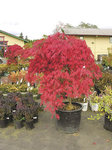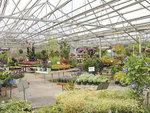

WOODLAND – For all you garden enthusiasts who plan to keep gardening, at least a little bit, into the fall and winter months, Tsugawa Nursery in Woodland offers numerous tips and suggestions for what to do in the garden and landscape during the month of October.
By visiting www.tsugawanursery.com/articles.htm, gardening lovers will find articles for each different month of the year detailing what should be done in the garden for that month. There are also other articles offering tips on annuals, perennials, trees, shrubs, vegetables, fruits and more.
Here are the tips offered on their website for the month of October:
Planting
Lily-of-the-Valley: Early October is a good time to plant lily-of-the-valley. Plant them in a cool, rather shady spot, about six inches apart. These plants spread, so plan to let them have plenty of room. Camellias: Set out new plantings in well-cultivated soil with plenty of compost added. Flower seeds: Try sowing wildflowers and some annual seeds after the first heavy rains. Let the fall rains wash them into the soil. Spring flowering bulbs: Plant with about one tablespoon of bone meal in each hole, in well-drained soil.
Berries: Plant when the berries lose their leaves. Planted now, they may have some berries next spring. Garlic: Plant the cloves in rich, well-drained soil. Plant with the pointed end up, two inches deep and 12 inches apart. Trees and Shrubs: Fall is well-suited for planting; plants establish before winter and get a head start on spring growth. Be sure to dig a large hole, add bone meal in with the soil at the bottom, and water the plants well, especially if the fall has been dry.
Fertilizing
Mulching: Don’t mulch for protection against frost until the daytime temperatures are usually below 50 degrees. The mulching blocks heat which the roots need for development. Roots on most plants keep growing until the soil temperature gets below 45 degrees. Later this month, mulch trees (keep mulch at least one foot away from the trunk), shrubs and garden areas. Lawns: Fertilize one last time before winter.
Pest & Diseases
Canker: Watch stone fruits (peaches, cherries, etc.) for signs of canker. If branches on a tree have wilted or died or if lesions have developed on its bark, chances are the tree has canker. The lesion usually weeps large amounts of sap or gum. There are two things you can do. First, cut off the dead branches now. Disinfect pruning tools with bleach solution between different branches. Second, as leaves begin to drop, spray the tree with Bordeaux mixture and spray again after all the leaves have fallen. If your tree dies of canker, remove it and fumigate the ground before planting another stone fruit tree there. Holly: If you’ve had holly blight (defoliates holly in late fall and winter) spray now. Roses: Watch for mildew and spray if needed.
Hints
Chrysanthemums: Mark which mum you want more of now so you can take cuttings in the spring. Dahlias: Dig them up when the top turns yellow. Cut to within four inches of the ground. Loosen the soil with a spading fork in a one foot circle around each plant and pry up the clumps. Let them dry in the sun for a few hours, then clean them and store them in dry sand or sawdust in a cellar or other cool, dark place. Asparagus: Get your beds ready to plant next spring. See the February tips for directions on making an asparagus bed.
Tuberous Begonias: Don’t wait for frost before preparing for winter. A severe frost could kill these plants. Dig each plant with a good sized root ball. Lift them from below and store them in a box in a cool place where it will dry out slowly but not freeze. When the top growth comes away at a touch, clean the tubers carefully of loose soil and store them in a cool, dark place. Broccoli: Pick when the buds are tight. Pick off the center clusters and side shoots will develop. If the buds begin to burst and get a yellow tint, the flavor will be strong.
Evergreens: They should be watered if the fall has been particularly dry. Geraniums: Bring them in before a heavy frost. You can winter them over in a variety of ways. One is to knock the dirt off the roots and hang. them upside down where they will be cool but won’t freeze. There should be little light. In spring, prune the plants lightly (both tops and bottoms) and repot them. Another method is to leave them in their pots or repot them and bring them inside. Try to keep them growing slowly in a room that is 35-60 degrees. Many garages will do as long as the plants do not freeze. Water them about once a month. Don’t give them any fertilizer. They will do better if they have some light (if not they may get leggy). Try to keep them in a semi-dormant state (no new growth). In March you can start fertilizing them again, but remember to keep them where they will not freeze.
Tomatoes: When pulling up tomato plants, check the root system. If the roots are shallow, it could mean that there was insufficient watering or the soil is too hard. If this is true, work in some compost and your plants will be happier next year. Pick your late tomatoes when night temperatures drop consistently below 50 degrees. Bring the green ones indoors and leave uncovered, out of direct sunlight in a room that is 60-70 degrees to ripen. Filberts and Walnuts: Spread a sheet or tarp under the tree and gently shake the branches to get the nuts easily.
Garden: Get new garden or flower beds ready now before the heavy rains begin. Turn the sod under and add manure and soil amendments. They will naturally decompose by next spring. Compost: Decomposition can be speeded up by chopping things into smaller pieces. Beat up leaves with a rake so bacteria can enter and break them down more easily. Turn compost frequently and water if necessary.
Raking: Oak leaves are acidic, so use them around rhododendrons and other acid-loving plants. Apple leaves should be disposed of, especially if your tree had apple scab. The scab spores overwinter on the leaves. Storage: Don’t store apples or pears with other fruits or vegetables. They give off ethylene gas which reduces the storage life of other foods stored around them. Store root crops separately so their earthy scent doesn’t invade others.
Upcoming classes at Tsugawa
The experts at Tsugawa Nursery hold monthly classes and seminars at their location in Woodland. October’s classes included the Annual Fall Potting Party, Winter Care for Mason Bees and, coming up, Bonsai workshop will be held Sat., Oct. 17, 11 a.m., at the nursery, 410 E. Scott Ave., Woodland. This informative class is all about bonsai. All levels are invited. Register online at http://www.tsugawanursery.com/classes.htm.